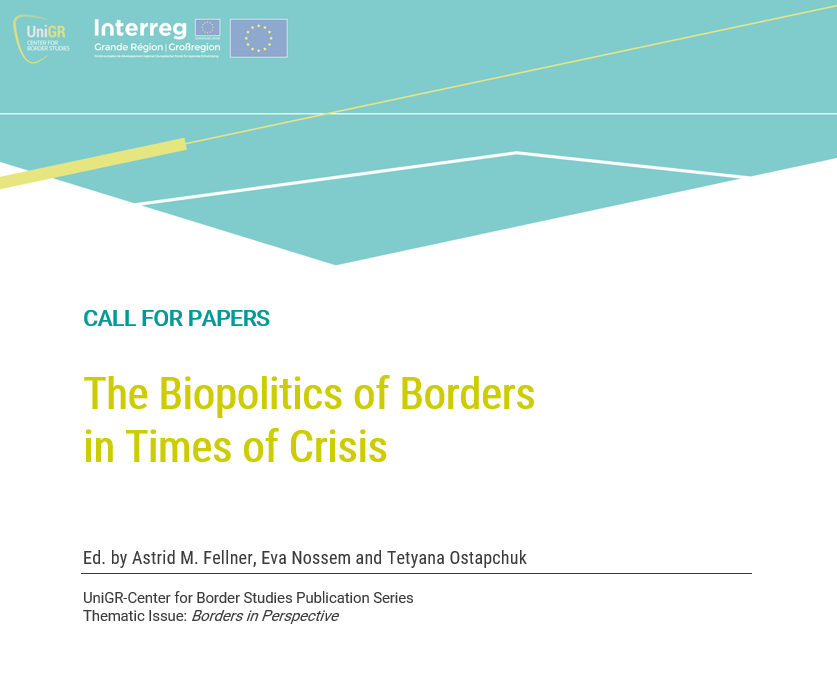Call for Papers: UniGR-CBS Themenheft Borders in Perspective

Call for Papers: UniGR-CBS Themenheft Borders in Perspective
Die nächste Ausgabe von Borders in Perspective trägt den Titel "The Biopolitics of Borders in Times of Crisis" und ist das Ergebnis der Forschungskooperation zwischen der Universität des Saarlandes (Prof. Dr. Astrid M. Fellner) und der Petro Mohyla Black Sea National University, Ukraine (Dr. Tetyana Ostapchuk) im Rahmen des DAAD-Ostpartnerschaftsprojektes "The Biopolitics of Borders in Times of Crisis (2018-20)". Das Themenheft wird von Astrid M. Fellner, Eva Nossem und Tetyana Ostapchuk herausgegeben.
“The Biopolitics of Borders in Times of Crisis”
The borders of our time are arguably more complex than ever: on the one hand, they are unstable concepts with shifting meanings, metaphors, and paradigms of thinking; on the other, they are hard facts, fortified geographical shells, hard to penetrate and often deadly. Furthermore, it is safe to say that in our current times of crisis (of democracy), borders have moved to the very heart of heated debates. From the porous interior boundaries of the Schengen space, to the mass migration challenging the external limits of the European Union, to the post-soviet military conflict zone in Ukraine, to the isolationist thrust of Brexit: After a period of de-bordering, we are facing a re-bordering, and the meanings of Europe and the ideals of democracy and civil society they stand for are being challenged. At the same time, much of the 2016 election debates and also of the current election campaigning in the United States were built around the idea of borders, whether it is the infamous wall between the US and Mexico, or the range of American interventions beyond the US borders, or even the popular discourse of people fleeing the Trump regime by crossing the border to Canada (the Immigration Canada website famously crashed on the night of the 2016 US presidential election, unable to handle the sheer volume of inquiries). Generally speaking, the dream and ideal of open borders seems poised on the brink of extinction: building walls is increasingly becoming the dominant narrative of today’s politics, institutional as well as cultural.
Neither are European and American border discourses clearly separated: from Donald Trump’s discursive use of the so-called refugee crisis in Germany and Europe as a means to illustrate supposed dangers of mass migration in his presidential campaign rhetoric, to the mutual support Trump and Boris Johnson expressed for each other’s political, ideological, and performative stance, to the United States enacting sanctions against Russia over a border conflict in Ukraine, European and North American border discourses and politics of today almost routinely meet and intertwine. At the same time, intra-American border conflicts stemming from the history and reality of colonialism, most notably resistance by Native Americans/First Nations which actively revives the problematic of (broken) treaties and problematizes the very notion of the nation, and with it the national border, garner international support not only from other Indigenous nations within the Americas, but also from Indigenous groups and well as non-Indigenous allies throughout Europe.
As borders tighten and close, bodies become increasingly vulnerable, rendering every political crisis a potential humanitarian disaster. This thematic issue will re-think Europe and the Americas through these crises and the challenges they pose. In so doing, it will specifically engage the transformation of European and American body politics in times of austerity, hyper-securitization, protest suppression tactics, and war. By approaching the current European and American crises through the conceptual field of the “border” and considering their impact on biopolitics in the fields of politics, literature, culture, and environmental struggles, this volume will contribute both to a critical analytical delineation of current (dialogic) processes in European and American civil societies and offer impulses towards the formulations of new visions of border conceptualizations and management.
In order to critically engage all these themes, we invite proposals along the following fields of inquiry:
- Border Crises and Populism
- Border Crises and Race, Gender, and Sexuality
- Border Crises and Civil Society
- Border Crises and Trauma
- Border Crises and Environment
- Border Art: Border Crises through Artists’ Eyes
Contributions (5000-8000 words) might address these topics through literary, cultural, linguistic, historical, or social approaches; additional themes may include affect, citizenship, displacement, exile, and geographies. Please submit a 500-word abstract and brief bio directly to e.nossem@mx.uni-saarland.de by January 31, 2020. Full papers will be due on May 1, 2020.
